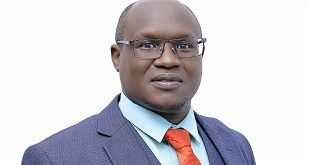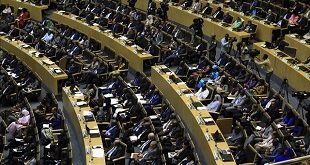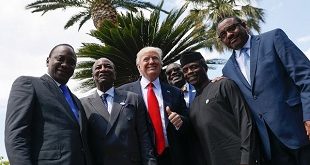Of course Western scholarship, journalism, the human rights and humanitarian movements and diplomacy do not invent disasters in Africa. Rather it is the way they focus and angle this particular aspect of our reality that I find questionable. Indeed, it is the almost complete exclusion of our other realities that consciously or subconsciously sustains these stereotypes. Thus, although explicitly racial arguments about Africa are rare today and when made are scorned upon, the campaigns to end poverty, promote human rights, democracy, feed the hungry, try African leaders at the International Criminal Court (ICC) etc are part and parcel of a construct that seeks to present Africa and Africans as incapable of self-government.
Thus, today, there are phrases, words and expressions that allow many people not to mention race in discussing perceived failures in Africa. But they are still able to present arguments about our perceived inherent inferiority. The point is that it is no longer necessary to talk about race. This is because talking about poverty, misery, hunger, brutal governments etc conveys the same message of Africans being backward, brutal, incompetent, incapable and hence in need of external intervention. Different factions in the West may disagree on the nature of intervention – some may call for military force, others diplomacy etc. – but intervene they must.
Anyone reading this article thus far would be tempted to conclude that we as Africans need to establish our own media, think tanks, universities etc through which we can generate knowledge about ourselves and tell our story without such stereotypes and prejudices. Actually that is the solution. But the problem is much more complex than that. If that solution is to work, the complexity of how we are intellectually constructed has to be understood. As economics Nobel laureate Robert Solow said, just because the tyre is flat does not mean that the hole is at the bottom. The fact that Western journalists report negatively about Africa does not necessarily mean that African journalists and mass media owned by Africans would report about the continent differently. On the contrary, they could even be worse.
In my experience, I find that we African elites perpetuate these negative prejudices and stereotypes. With Rwanda, for example, the most outlandish stereotyping is done by its own journalists supported by like-minded allies in the regional press. A Western journalist may seek some little evidence in spite of the low professional standards required by her news organisation when reporting on Africa. This is because of her training and the standards – even if low – required of her by her employer. She is also likely to check her back for likely accusations of racism and hence tamper her statements with some qualifiers and reservations. The African journalist is restrained by neither.
Steve Biko said that the greatest weapon in the hand of an oppressor is never his armies – these are secondary. It is the mind of the oppressed. The overlord uses control of communication channels (mass media, think tanks, universities, books, education curricula, religion, philosophy etc) to create a particular world view – what Antonio Gramci called hegemony. This is a mind-frame or belief system of what is normal, regular and right – as opposed to the abnormal, irregular and wrong. In other words, the production of knowledge is an important instrument of social control.
We African intellectuals and elites know about ourselves largely (not entirely) through the writings of non-Africans. So we go to Stanford and Harvard, Oxford and Cambridge to be taught who we are, what we are, what we think, what we want, what we do, how we do it etc. Most books and research work about us is produced by someone other than ourselves. We participate in its consumption, not its production. The biases, prejudices and stereotypes generated may not be driven by deliberate racial intent. However, research into cognitive bias shows that both conscious and sub-conscious biases lead to prejudiced views and actions even when the individual does not want to do so.
I think most western scholars on Africa are anti-racist and seek to be as race neutral as possible. However, they come with particular biases – most of them sub-conscious – based on their education, culture, history, beliefs etc. These generate cognitive schemas or thought structures that influence what we notice and how the things we notice get interpreted by our minds. Studies show that such schemas operate not only as part of conscious, rational deliberations but also automatically i.e. without conscious awareness of intent.
For example, in the United States, the mass media is awash with news of criminal activity on a daily basis. In most cases, the criminal is always a black male. In Michael Moore’s documentary, Bowling for Columbine, there is a play of actual television news reports sounding like a broken record in the way they repeat this description of a criminal suspect. Research studies into this cognitive bias show that after decades of media reports, it has sunk in the social consciousness of the Americans, including black people, that a criminal suspect is always a black male.
There was a study in America involving a video game where participants were asked to shoot as quickly as possible at a target they suspected was armed. Each target would be of either a white or black person. As the results showed, participants were more likely to mistake a black target as armed even when he was actually unarmed and more likely to mistake the white target as unarmed when he was actually armed. Black participants in the video game were also as likely as white participants to shoot at unarmed black targets as opposed to armed white targets. These results showed a pattern of discrimination based on subconscious thought processes, not conscious deliberations – meaning that over the years, a common “wisdom” has penetrated the social consciousness of Americans that a black man is a criminal.
The point is that the knowledge created by western scholarship and mass media that is imparted to us shapes our self-perception. For example, there are many things our governments do as part of democratic deal-making that we claim are signs of failure of our democratic process. Yet these very same actions are seen in western democracies as costs of democratic compromise. Indeed, African elites are quick to see the specks in our societies and remain blind to the logs in western ones.
For example, elites in Africa may condemn Rwanda and Uganda occupation of DR Congo – a country with an absentee state just across the border. But they see nothing wrong with America and NATO occupation of Afghanistan some 10,000 miles away for over a decade. A few killings by an African army get so much coverage compared to hundreds of death at the hands of American and NATO aerial bombings in Pakistan and Afghanistan. We are therefore active participants in processes that encourage and reproduce stereotypes against us.
Therefore, the challenge for Africa is not merely to create our own mass media houses, universities and think tanks and staff them with people of our skin color. The primary challenge is to develop self-awareness – to understand the world we live in and challenge the images of who we are that have been constructed. There are many non-Africans in Western institutions who would see our point of view and advance it in their own media. But it is important that we actively define who we are and develop images, symbols, and schemas that reflect this self-perception. Only then can we expect others to respect us.
Immediately after independence in the 1960s, there was an attempt to do this. What happened? I will return to this question next week.
amwenda@independent.co.ug
 The Independent Uganda: You get the Truth we Pay the Price
The Independent Uganda: You get the Truth we Pay the Price


